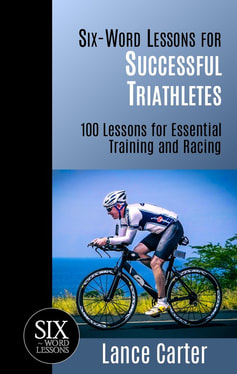 Have you ever noticed when you ask yourself an open ended question your mind goes to work and brings forth answers? Sometimes the answers come immediately, sometimes they come to you while you are sleeping, sometimes they materialize in the world in the form of a coincidence. Let me give you some examples. I've talked with many people who say to me, "I could never do a triathlon; I can't swim." Their brain receives that message loud and clear and turns its attention to something else. Compare this to the person who says, "A triathlon? Well, I don't know how to swim. I wonder if I could do a triathlon and if I could learn how to swim?" Now their brain begins to recognize opportunities to learn how to swim. Maybe it's a flyer posted on a wall for swimming lessons, maybe its at a party and someone is talking about their first triathlon and the person initiates a conversation inquiring how this other person did their first triathlon. Maybe like in my case as I am flipping through the list of courses offered at Chico State there is a PE course called, "Triathlon 101." What if we made a practice of asking ourselves questions on a daily basis? Questions that serve us and help us create more fulfilled lives. For example, how can you experience more enthusiasm today? How can you bring more enthusiasm to what you are doing today? If you come up blank, this is an excellent opportunity to create for yourself a moment in your day that brings you joy. Ask yourself, "What can I do that would bring me joy? Once the answer comes, plan it into your day and execute. When you experience the joy make note that you created this moment and you can do so tomorrow and the next day as well. I ask myself a series of questions each morning and each night and without a doubt doing so has improved my mental state a thousand times over. I'll give you an example from just this week. A few days ago when I was asking myself, "Did I live today? Did I feel alive?" The answer quite honestly was NO. Then I asked myself what I could have done that would have changed my answer to those questions. On this particular day I worked 9+ hours and I did not exercise. I knew that had I gone on a bike ride or for a run I would have felt more alive. So the next day I vowed to myself that I would go run. The next night when I ask myself the same question, my answer was YES. As I looked back on my day I recognized two events that made me really feel alive and added more enjoyment to my day. One was my run at lunch time and the other was going out with my wife to get a bite to eat and a pint at Crux Brewery. Those two activities were planned as a way to create more enthusiasm for life. Another extremely powerful question to ask is, "What if?" Unfortunately we often ask these "What if" questions and immediately go to the negative as in what if I take this risk and I fail? Any time you find yourself doing this immediately ask yourself the same question and focus on the positive outcomes. As in, "What if I take this risk and I am successful? What would that mean for me and for my life? How would that positively impact my life? How would it positively impact other's lives?" Answering a "What if" question in the negative is your survival mechanisms way of "keeping you safe" while answering in the positive is the beginning of action and growth and maybe even a life transformation! Another version of the "What if" question is what I experienced after my first IRONMAN Triathlon back in 1993 when I asked myself, "If I just completed this thing I thought was impossible, what else could I do?" If you're read my book, Live Big: Crossing the finish line is just the beginning you know that my asking this question set my life on an entirely different path and completely changed the direction and the experiences of my life. If you find this blog post resonates with you and you want to know more about the questions I ask myself each day please send me an email at [email protected] as I have a whole lot more I'd love to share on this topic. Go out TODAY and live your best life! 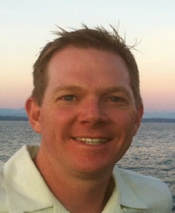 Lance Carter is a triathlon coach as well as a nine-time IRONMAN® triathlon participant who has been training and racing since 1993. He is the author of Six-Word Lessons for Successful Triathletes. See more at lancecartercoaching.com.
0 Comments
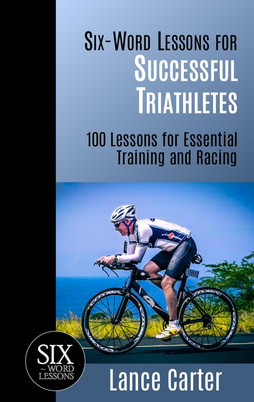 Once I had written and published my second book several people I know confided in me they too would love to write a book. Part me suspected they were really thinking, “If he can write a book then surely I can too!” Soon I found myself giving the same answers over an over to questions like, “How long did it take? How did you do it? How did you get it published?” I decided to form a private Facebook group called Aspiring Authors. It has been reported that 81 percent of people want to write a book and yet only one percent actually do. I saw this play out in real time with the Aspiring Authors. The first day I posted about it on Facebook over 25 people joined. There was A LOT of enthusiasm. As the weeks went by the excitement gave way to the reality that writing a book is hard work and takes commitment. I can say honestly for me, writing a book was the third hardest thing I’ve done in my life and it also is among my most proud accomplishments. It’s right behind my first IRONMAN Triathlon and opening my own retail running specialty store. I’ve also come to realize that writing a book is a metaphor for succeeding at anything in life one wants to accomplish. Why? It takes Commitment, Consistency, Clarity, Community, and overcoming Challenge. Writing a book, organizing your thoughts, creating sentences and paragraphs that paint a picture and convey a point of view is difficult. Very difficult. Any worthwhile achievement is. It’s never going to be perfect the first time out and is going to require reviews and rewrites. Thomas Edison is quoted as saying, “I’ve not failed. I’ve just found 10,000 ways that won’t work.” Writing a book in many ways is simply about determination and NOT giving up! I love listening to podcasts and I’ve heard many best-selling authors discuss in great detail how they struggle in their writing. One way they get through this is to be consistent. They set aside time each day and commit to writing for a set period of time; even if what they write that day is total crap. If several New York Times Best-Selling authors struggle, you can bet the rest of us are going to struggle too. Think for a minute about your life, the great parts and the parts you’d like to improve. I am willing to bet, good or bad, your life is a reflection of what you do on a consistent basis. Consistency is the key! Achieving goals requires a clarity of vision; focus. Completing a book absolutely requires one to, “Have an eye on the prize” as the saying goes. It’s incredibly powerful and necessary to have a strong burning desire of completion. Just when you think you are finished you get the “edit” back and you don’t know whether to scream, cry, pull your hair out or simply throw in the towel. You have to hang on to your WHY, to your vision. Community is critical in accomplishing goals. Very rarely, despite appearances, is something accomplished completely independently of others. There are always people behind the scenes who play important roles. I was very fortunate to have many friends who read drafts offering feedback and encouragement along the way. My friends Rose and Dave improved my second book a thousand times over, thanks to Rose’s editing and Dave’s magical creation of my cover. I firmly believe I would not be an author if a friend had not recommended that I meet with Patty of Pacelli Publishing. While I certainly did a lot of the heavy lifting, my books were completed with the help of many people. Every great accomplishment comes with an equal challenge to overcome. Just like most challenges in life, many of the obstacles are mental. “Who I am to write a book? Why would anyone be interested in reading what I have to say? Am I even capable of this task?” These are just a few of the self-doubts and negative thoughts that pummel one’s mind. Here’s the great news: making it through such a monumental task of writing a book will impact your life in ways you cannot imagine. Overcoming the challenges that come up when writing a book make you a stronger person and elevate what you are now capable of. In many ways, writing a book very much left me with the same feeling when I crossed the finish line of my first IRONMAN and lost 15 pounds from exercising for thirteen hours forty-one minutes and nine seconds in 103-degree heat. If I can do that, what else am I capable of? 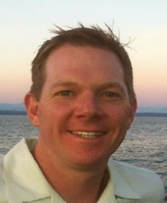 Lance Carter is a triathlon coach as well as a nine-time IRONMAN® triathlon participant who has been training and racing since 1993. He is the author of Six-Word Lessons for Successful Triathletes. See more at lancecartercoaching.com. 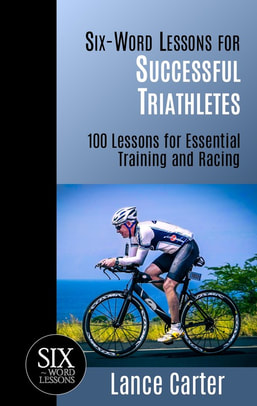 1. Dude, don’t take yourself so seriously 2. Engage in your training with seriousness When I wrote my recently released book, “Six-Word Lessons for Successful Triathletes: 100 Lessons for Essential Training and Racing” I positioned these two lessons at the very beginning of the book because I wanted to remind people that triathlon should exist in our lives to enhance the experience of living and that it should not become our life. I’ve seen too many people take their training and racing so serious that they literally lose friends and destroy relationships. At first glance it may seem that these two lessons contradict each other when in fact they work in concert with each other. Each workout you do should have a purpose. Sometimes the purpose is simply enjoyment of the activity and sometimes it’s merely social. Other times, especially if you are training for a particular race and/or have performance goals, you’ll need to cover a certain distance or hit certain speeds for predetermined distances. Taking your training serious means you understand the purpose for each workout and you understand how each workout combines with the rest of your training schedule to get you to your goal. It means when you train, you do so with intention and you are present in the moment. Training in this way connects you with something bigger than yourself and as corny as it may sound, it helps you live a more fulfilling life. Endurance sports have the power to boost self-esteem and personal confidence. When a person crosses the finish line of a race they are not the same person that toed the line at the start. The longer the race, the more dramatic the effect. It’s why nearly every person that has finished their first Ironman will tell you it changed their life. If I may quote myself, “Crossing the finish line is just the beginning of a new you.” When it comes to taking ourselves too seriously this is a lesson we usually have to learn the hard way. It’s great that you have a new found love for your new sport, and it’s great that you want to share your experience with the world but do it with awareness. Your triathlete friends are likely to be just as happy to talk to you all day about your training and racing; what flavor of GU you prefer and your favorite chamois cream. Your non-triathlete friends however, have a very limited desire to hear every little detail of your training and to take up the entire conversation. Know your audience. Share appropriately. I’ll give you a lesson that I learned the hard way in hopes that it saves you some grief. When your friends or family come to watch one of your races which is about as fun as watching paint dry, the last thing they want to hear for hours and days after the race is how you could have been faster if only……. yada, yada, yada. They simply want you be happy and they want to know that you enjoyed your day. And when you go on and on with what sounds like complaining they legitimately begin to wonder why they gave up their entire day, weekend, and in some cases vacation to support you; only to have you bitch about it. Even if you have the worst day ever, thank your friends and family for coming and tell them how much it means to you. Save the “what if’s” and “could’ve beens” as well as the second guessing of your training for your triathlete friends. After all, they’ve been there too and know what you are going through. That doesn’t mean you don’t share parts of the race with your non-triathlete friends, just not every single second. Keeping these lessons in mind will help you enjoy the sport of triathlon for many years to come! 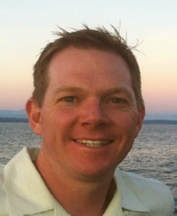 Lance Carter is a triathlon coach as well as a nine-time IRONMAN® triathlon participant who has been training and racing since 1993. He is the author of Six-Word Lessons for Successful Triathletes. See more at lancecartercoaching.com. |
See the Authors!
All
|

 RSS Feed
RSS Feed